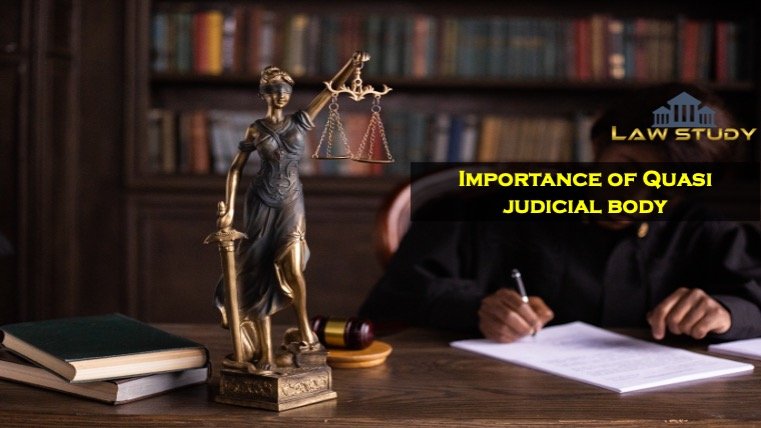Introduction of Importance of Quasi-judicial body: A quasi-judicial entity, such as an independent arbitrator or tribunal board, has similar powers and processes to a court of law or a judge. It is required to determine facts objectively and make conclusions from them in order to form the basis for official action. Their jurisdiction and competence are typically restricted to a particular matter, such as Public Standards, financial markets, and land use & zoning, etc.
Quasi-judicial bodies include the National Human Rights Commission (N.H.R.C), National Commission for Women, National Commission for Minorities, etc
Functions of Quasi-judicial body
- These bodies typically have adjudication authority in areas such as violation of discipline, behavior standards, and trust in financial or other matters.
- Their jurisdiction and expertise are typically restricted to a specific list of subjects, including public standards, land use, employment law, or a set of authority laws.
- They assist in the faster delivery of judgments due to specific responsibilities.
- It gives you the option of specialization.
- They assist in reducing the burden on the H.C & S.C.
- They are more inexpensive, efficacious, and accessible to the common citizen.
- They operate under the principles of Natural Justice, and their decisions are frequently based on a set of norms.
Characteristics of Quasi-judicial body
- Similarly to enforcing bodies: Quasi-judicial bodies are institutions with powers comparable to those of law-enforcing organizations, but they are not courts. Although courts have the authority to oversee all types of conflicts, quasi-judicial authorities have the authority to impose laws on administrative authorities.
- Specific purpose: These were made for a specific reason. Consider the following explanation.
- National River Water Dispute: The Tribunal has the authority to make a decision on how to divide/share water among disputing states.
- The Central Administrative Tribunal: was established to investigate civil servants’ service disputes. For example, determining the age of a civil servant in the case of a dispute, etc.
- National Commission on Human Rights: The National Human Rights Commission is a quasi-judicial agency responsible for the purpose of examining cases of human rights abuses. It was founded in 1993 as part of the Human Rights Act. They can conduct investigations into human rights violations and make recommendations for steps for action.
- Election commission: Constitutional bodies primarily function to conduct, control, and supervise elections. It also performs judicial functions, such as determining the disqualification of a legislator or investigating an infringement of the model standards of conduct.
- Other governing bodies: Other quasi-judicial regulatory agencies include SEBI, TRAI, IRDA, etc. Their main goal is to ensure market economic transparency. They also take legal action, such as penalizing people who break the regulations or imposing penalties.
- Nature of bodies: The bodies’ functions can be regulatory, statutory, or constitutional in nature. The National Human Rights Commission, for example, is a statutory organization, but the Finance Commission was established u/a 280 of the Constitution. SEBI, on the other hand, is a regulatory authority that also has judicial powers.
- Expertise: These committees do not have to be chaired by a judge; specialists with sectoral knowledge, such as finance, economics, and law, can also be included.
- Judicial review: These bodies’ decisions can be appealed to a court of law, which is the supreme authority.
benefits of Quasi-judicial bodies include
- Low Cost: In the traditional judicial procedure, a significant portion of the population is hesitant to approach the courts, negating the goal of justice. On the other hand, tribunals have a minimal overall cost, which allows and encourages people to seek remedies for their disputes.
- Simplicity: Tribunals and other similar bodies do not have any lengthy or complicated procedures for submitting applications or evidence etc.
- Expert Knowledge: A tribunal is made up of experts who are familiar with the complexities of a case, as well as the actions that must be taken and the repercussions of those actions.
- Workload reduction: Tribunals, by taking up specific cases, greatly assist in sharing the Judiciary’s massive workload. In a country with 2.81 million pending cases, it is essential to find ways to reduce the burden on the judiciary.
Issues and Problems in Quasi-judicial Body
- Funding: Because tribunals are not funded by the government, one party may be at a disadvantage if the parties can afford to hire an attorney to represent them, rendering the procedure unfair.
- False cases: While decreased Tribunal costs inspire people to pursue justice, they also attract a large number of false claims.
- Burden: Though the concept and operation of Tribunals and Quasi-Judicial Bodies are still relatively new in our country, they are frequently understaffed and overburdened by an ever-increasing number of cases, making it impossible for them to carry out their duties efficiently. The losing side frequently challenges a Tribunal’s ruling in a High Court, which defeats the purpose of Tribunals.
A quasi-judicial body is a good idea in general because it relieves the burden on the judiciary, but there are certain issues in this structure as well. Individuals with both technical and legal understanding should be chosen by the government, and the power to make decisions should be given to them.
Conclusion
Quasi-judicial bodies were intended to relieve the burden on the judiciary, but now that the Supreme Court has ruled, these groups’ decisions can be appealed to the High Court. Furthermore, several of these committees serve solely as advisors and thus have no actual authority. To be effective, steps must be taken to grant them autonomy and genuine powers on par with the judiciary.

























